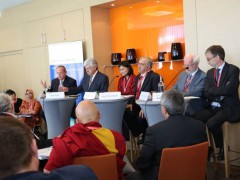Zen and the Art of Growth Maintenance

At the previous session I attended at the GES things had gotten a little bit philo– if not straight up theo-sophical. At this one, curiously entitled “Economics, Intersubjectivity and the Crisis of the Future” I was seated next to a Buddhist monk. With shaven head and dressed in the traditional monks garb, he was dilligently taking notes as the panel seemed to meander in and out of such varied fields as philosophy, economics, neuroscience, philosophy again and religion. The main question that so aroused this practitioner of a religion known for its self control revolved around Growth, a concept more straightforward than Success. Perhaps a little too straightforward because Growth has taken on an almost religious dimension over the last two decades and what we are experiencing now is a crisis of faith.

Image courtesy of the GES Facebook Page.
Following the panel discussion was quite an academic, highbrow, intellectually demanding exercise but the jist of what they were saying is quite simple. As we have advanced from a faith-centric society to an economic-centric one, we have taken our position as lords and masters over science and nature. Only now with nature getting out of control, thanks in no small part to our own impact on the climate, and with our economic growth models faltering, we find ouselves in a further crisis of ‘faith’. “Growth” , one of our main determinants for economic success has come under serious scrutiny of late and there is an entire generation losing its quasi-religious faith in the fact that “Growth” can be sustained indefinitely, hence the search for new models and new ways of redefining what a successful economy and, indeed, a successful society looks like.
This is what my Buddhist friend was taking notes on. Because while most of us are still happily following our own particular religions (or lack thereof), the Growth paradigm includes us all, regardless of our beliefs. Perpetuation of Growth at exponential rates has transcended belief (something that, as a panelist pointed out, involves trust) to become a frame of reference. And with our frame of reference quite askew in these last five years and possibly getting even shakier, we have been seeking and indeed finding culprits for the slow demise of Growth in either the defunct “sects” of our religion, (whether we blame Keynesianism or the Austrian heresy) or often quite literal infidels – always easy scapegoats for any problem.
Near the mid-point of the session the very American businessman sitting on my right leaned over during a particularly heavy philosophical diatribe by Mrs. Monique Canto–Sperber and asked me quite skeptically “Do you understand any of this?” Sadly I realised that, while yes, I did understand some of it, and certainly more than my non-philosophically-inclined neighbor, I most probably wasn’t understanding nearly enough. Perhaps in these last few years of economic tailspin, botched solutions and indecisiveness that has been the issue with us all. Perhaps we’re all so caught up in the cult of “Growth” that we haven’t yet realised that the church has burned down and the congregation is slowly moving on. Moving on to what? That remains to be seen and, hopefully, the GES might provide a prototype solution.
